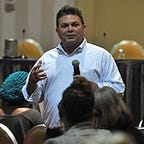What “Instructional Tolerance” means and why it matters…
Speedchange.at.medium
Grant Lichtman wrote a great post on ‘Teaching the Death of Compromise” that I found really essential. But one quote caught as I read past — ”In school or at home we would never countenance such a solution amongst our children. The idea that changing the rules to win because, at this moment, I can, and that somehow that is the right thing to do, runs contrary to everything mature adults know about how human social groups work best.”
It caught as I tried to digest it because, well, isn’t this exactly what we do to children in our schools every day? “The idea that changing the rules to win because, at this moment, I can, and that somehow that is the right thing to do.”
My first thought was the obvious — that teacher who says “you’re late the minute the bell rings,” but 50 or 80 minutes later says, “the bell doesn’t matter, you wait for me to dismiss you.” Yes, these teachers still work in our schools. But it’s so much bigger and so much more insidious than that.
We all know that we constantly change the rules with kids so that, “we win.” We change the rules every time kids change classes so they suit our personal adult preferences. We change the rules depending on the day, the month, or just adult mood swings — perhaps one child has angered us or upset us — perhaps it is testing month — perhaps we think the weather is bad, even if kids don’t. Perhaps many things. But for whatever reasons our rules for kids change so that ‘we win,’ so that we remain in control.
Instructional Tolerance
More than a decade ago at Michigan State University’s College of Education (this is NOT an endorsement of any graduate program there — just to be very clear) a few of us began to talk about Instructional Tolerance, the idea of teachers — school adults — accepting student choices: choices in seating, in technology use, in use of time, in use of learning strategies, maybe even in order of skill and knowledge acquisition. It seemed both an incredibly radical idea and yet so amazingly obvious. After all, this concept had been proven across the world for a hundred years — from Marie Montessori to John Dewey to the Summerhill-style and open classrooms and Schools-Without-Walls of the 1960s to the 1980s. But, of course, it was an idea vehemently denied by over a hundred years of school administrators and teacher education institutions.
So, what’s the truth? And what’s the problem?
The unfortunate truth is that classroom management and our structures of school are indeed about “winning.” About winning a victory over what we see as the great dangers of childhood and adolescence. We treat children and adolescents as if they are dangerous aboriginals who must be civilized. The spontaneity, the curiosity, the invention, even the patience of kids are conceived as things to be crushed and eliminated.
The bullying that occurs in schools begins right there, with adults seeking victories over kids in that cultural/colonial war. And that is the primary thing kids learn in school.
They learn about power, and how power is personal, and how power is abused. They learn that humans don’t really deserve to be seen as equally deserving of dignity, but are to be classified and ranked, honor rolled or not, put on the team or cut.
When we read Grant Lichtman’s brilliant piece on the disintegration of our society we in education need to accept our share of the blame. We teach the wrong things, we sell the wrong vision of the world, we allow Mitch McConnells and Donald Trumps to develop and see themselves as entitled.
And that’s what makes Instructional Tolerance essential. The minute we teach children that our own personal preferences allow us to limit their world and their learning simply because of short term positional power, we start down the dark path to the current way our Supreme Court justices are chosen.
How do we change that? How do we change that now?
- Ira Socol
